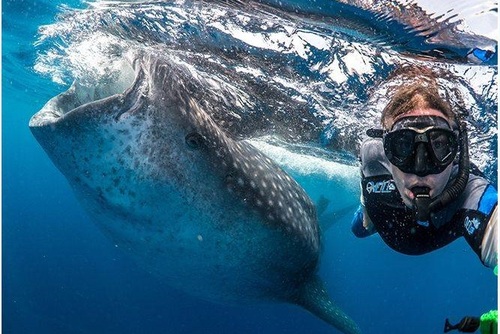During your time volunteering on this unique project, you directly contribute to the marine conservation project and activities of the Marine Megafauna Foundation and work together with its world renowned scientists in the field of the ocean giants - manta rays and whale sharks. This exciting program has been designed and will be monitored (whether on-site or remotely via Skype conference) by the world-renowned ‘Manta Queen’, Dr. Andrea Marshall. As she herself puts says:
During your time on this unique volunteer project, as well as getting a dive qualification, which is included in the project fee, you will directly contribute to the marine conservation project and activities of the foundation and work together with its world renowned scientists in the field of the ocean giants - manta rays and whale sharks. This exciting program has been designed and will be monitored (whether on-site or remotely via Skype conference) by the world-renowned 'Manta Queen', Dr. Andrea Marshall.
Whether Dr. Marshall is on site during your stay or not, you will always remain under the guidance of a highly qualified and experienced Research and Volunteer Coordinator and you will also have continuous access to other marine biologists, who will always be available to answer any queries that you may have about any aspect of the project. Volunteers will be involved in all of the Marine Megafauna Foundations programmes. This will involve assessing the health of populations of manta rays, whale sharks, marine turtles (including critically endangered leatherbacks), dugongs and even humpback whales (during the winter months).
Itinerary
Day 1
Arrival into Tofo via Inhambane Airport (only 22kms away). A project representative will meet you at arrivals and will transport you to your accommodation. Don’t worry – the airport is tiny so you won’t get lost!
Day 2-3
After your arrival you will receive a two day period of induction and training by your research and volunteer coordinator. For non-divers, you will start with a recognised PADI Open Water scuba course, or if you already have this a PADI Advanced Open Water scuba course with partnering dive company Peri-Peri Divers (costs are already included within the programme). This will take you between 4 and 7 days depending on the weather and sea conditions. If you are already an Advanced Open Water qualified diver, you will start your research programme immediately.
Day 4-14
During these days you will be engaging in 8 research dives, an estuary research snorkelling trip, 2 megafauna research talks and will be participating in daily research activities. Even though you will be taking part in a variety of activities 5 days a week, there will be sufficient free time for you to explore and enjoy everything Tofo has to offer.
Day 15
On this, your final day and after saying goodbye to the project staff and the volunteers you have gotten to know whilst at the project, you will be transferred back to Inhambane Airport for your onwards flight or you will commence your onwards travel plans.
Project Activities
On this project you will get the chance to take part in a wide variety of exciting activities. Below are examples of some of those included in this project.
Manta Ray Work
This will include photo ID-ing the reef and giant mantas (up to 9 metres across!) as you see them, laser measuring individuals, watching and assisting scientists in taking biological samples, as well as uploading identification pictures to relevant databases and record re-sightings on mantamatcher.org.
Whale Shark Work
The area immediately off Tofo is a global hotspot for the world’s largest fish, with over 620 of these gentle giants identified within Mozambican waters. You will actively help in whale shark research by: Training in whale shark photo ID-ing and watching the process of tagging and tissue sampling, Gathering information on GPS location, segregation, sex, behaviour and specific characteristics such as scarring, Taking underwater pictures of the personal “fingerprints” of whale sharks, Uploading pictures to databases and recording re-sightings and contributing to the analysis of this scientific data in close collaboration with the Marine Megafauna Foundation.
From the months of November to February, you will contribute to the collection of data from three of the turtle species found here (loggerhead, hawksbill and the critically endangered leatherback). This will involve monitoring the landing of turtles, taking GPS data on their nesting sites to gather information on poaching, monitoring the success of nesting and photo ID-ing the specimens as you see them.
Coral reef and estuary monitoring involves data collection on an array of reef fish species and the cover of coral on reefs. You will assist by: Recording indicator species by making reef transects, Making timed counts of the numbers of each indicator species and Filling in identification logs of an array of species.
In addition to collecting data on whale sharks, manta rays, turtles and humpback whales (in season), you will also gather valuable information on other threatened species of megafauna within the area. This will include conducting surveys on dolphins, bowmouth guitar sharks and the small eyed stingray – the largest marine stingray in the world.



